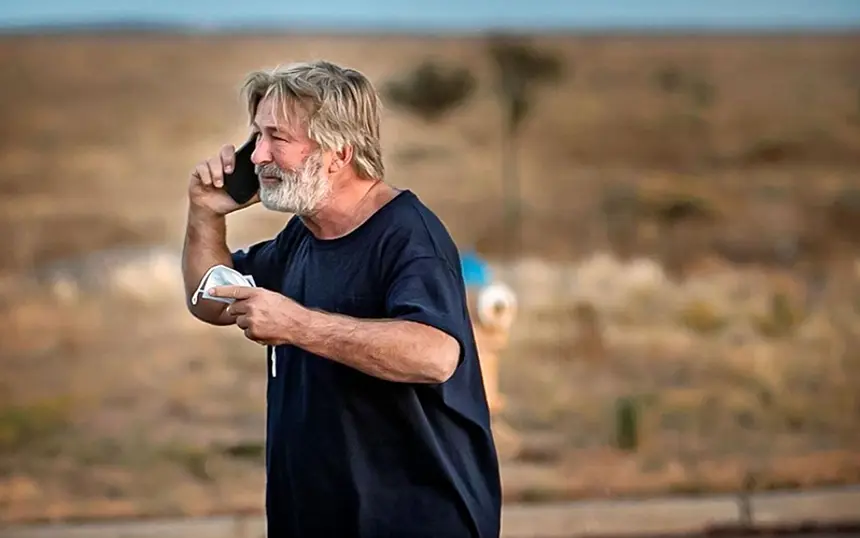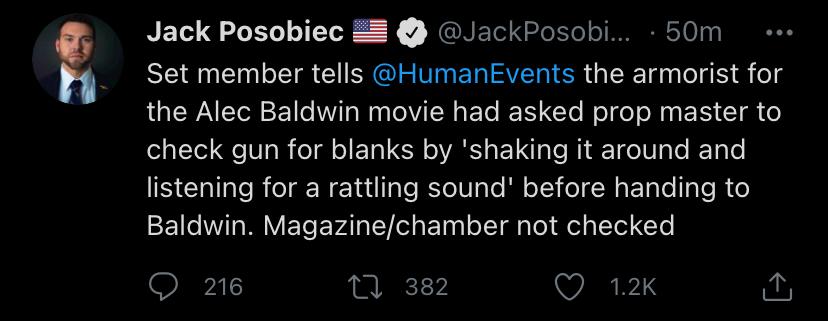Details: woman killed was married to a cat involved with the Killary machine. Woman seems to have been Russian with time in Ukraine. Coincidence ?I've grown cynical when it comes to any media story. This, however, doesn't pass the smell test at all. Once...an accident. Twice...not so much. The whole thing seems odd.
Media will either cover for him or it will be full tilt anti gun. Whatever the case, it will certainly distract from the V deadlines, worker walkouts, inflation and empty shelves.
Join the Hide community
Get access to live stream, lessons, the post exchange, and chat with other snipers.
Register
Download Gravity Ballistics
Get help to accurately calculate and scope your sniper rifle using real shooting data.

Install the app
How to install the app on iOS
Follow along with the video below to see how to install our site as a web app on your home screen.
Note: This feature may not be available in some browsers.
You are using an out of date browser. It may not display this or other websites correctly.
You should upgrade or use an alternative browser.
You should upgrade or use an alternative browser.
Alec Baldwin literally just shot two people
- Thread starter Bender
- Start date
Maybe Alec got into that Russian , you know just the tip game at first and she was going to break her silence. Alec has to decide to deal with a crazy Russian woman or the Spaniard born in Boston , he made the right choice.Details: woman killed was married to a cat involved with the Killary machine. Woman seems to have been Russian with time in Ukraine. Coincidence ?
The Three Stooges used guns and cannons on the set all the time and never killed anyone.
One thing that I’ve learned about successful comics is that they are some of the smartest people in the world.
I don’t know much about the three stooges but when you look at their slapstick routines, they had to have been carefully thought out, choreographed and rehearsed. The stooges were comic geniuses.
They were also the type of people to realize that they aren’t as smart as they think they are. In and of itself; that mindset shows that a person is really smart.
I’m using a lot of words to basically say that they weren’t the know-it-all asshole that Baldwin is and would have never did what he did. Comedy is serious business.
"According to the affidavit, the 63-year-old actor was rehearsing removing the gun from its holster and aiming it at the camera when it went off."
It should read: According to the affidavit, the 63-year-old actor was rehearsing removing the gun from its holster and aiming it at the camera when he removed the revolver with his finger on the trigger and then pulled the trigger while pointing the weapon at the victim.
It should read: According to the affidavit, the 63-year-old actor was rehearsing removing the gun from its holster and aiming it at the camera when he removed the revolver with his finger on the trigger and then pulled the trigger while pointing the weapon at the victim.
Word now is the armorer wasn't even allowed into the building they were filming in due to covid restrictions so good luck pinning this all on her. She's a fucking retard to be sure, but so is everyone else that participated in this operation based on the current reports. Armorer doesn't check firearms in and out. Firearms left out in the open for anyone to tamper with or take. Armorer doesn't supervise use of firearms. Live ammo allowed anywhere near to a movie set. People handling firearms without any respect to basic safety rules. Everyone in the chain was negligent.They are already throwing the armorer under the bus on the news this morning . They quoted her as saying even though her dad was an armorer she picked it up on her own. And she supposedly said loading blanks scared her....
Husband is going to get paid off, the DA is going to look the other way, and this will all be written off as a tragic accident. You can also bet on new industry regulations (codified common sense) named after the deceased.
Saw this on a thread yesterday - "Guns don't kill: Alex Baldwin does". Where can I buy the sticker!
"According to the affidavit, the 63-year-old actor was rehearsing removing the gun from its holster and aiming it at the camera when it went off."
It should read: According to the affidavit, the 63-year-old actor was rehearsing removing the gun from its holster and aiming it at the camera when he removed the revolver with his finger on the trigger and then pulled the trigger while pointing the weapon at the victim.
Exactly. Guns don't just "go off." You pulled the freakin's trigger, you numbnut.
Maybe I missed a reply but has anyone mentioned that this narcissistic dumbass actually pointed the gun at the director and pulled the trigger? Any of us less “important” and “famous” people would be in jail
Accidental discharge is when I sneeze then crap myself.No such thing as an accidental discharge.
Without much other thought I would agree.Accidental discharge is when I sneeze then crap myself.
Unless you're a sicko like maser, who shits himself on purpose
The Three Stooges used guns and cannons on the set all the time and never killed anyone
nuck nuck nuck.....eeehh........wise guy
Last edited:
And I'm pretty sure it was a single action revolver, so somebody cocked the hammer.
And that person would be Baldwin...And I'm pretty sure it was a single action revolver, so somebody cocked the hammer.
And I'm pretty sure it was a single action revolver, so somebody cocked the hammer.

Legal Analysis: Does Alec Baldwin Have Criminal Exposure After Shooting Woman Dead In Apparent Mistake?
Innocent Accident, or Involuntary Manslaughter?
In that last hypothetical we have no innocent accident, and we have no mere civil negligence—instead, we have, with the pointing of the weapon at the victims and the deliberate press of the trigger, criminal recklessness.
The gun did not go off for unforeseeable reasons, such as a hidden defect. The gun discharged because it operated as designed—to fire when the trigger is depressed. Of course, the gun must be loaded when the trigger is depressed in order to cause harm—but as the tragic consequences here amply demonstrate, the gun was loaded. It would be the duty of the person wielding the gun to ensure it was unloaded if they wished to cause no harm when they depressed the trigger—and clearly that duty was not met.
Second, anyone handling an inherently dangerous object such as a firearm would be presumed to possess the safety knowledge needed to handle that firearm safely around others—a claim of ignorance is no defense when one is handling inherently dangerous objects.
That guns are inherently dangerous is common knowledge presumed to be known to everyone. That the rounds fired come out of the muzzle and travel with lethal force and distance is also common knowledge presumed to be known to everyone. That guns discharge when their triggers are depressed is also common knowledge presumed to be known to everyone.
Because the various common knowledge just described would be presumed to be known to everyone, including Alec Baldwin handling the firearm, when he pointed the weapon at Ms. Hutchins and pressed the trigger (again, speaking solely within the context of our hypothetical, not as a claim of what actually happened), then he was necessarily aware of the risk of death he was creating, and deliberately disregarding that risk, with the result being the death of Ms. Hutchins. (The same would apply, of course, to Alec Baldwin’s violation of the gun handling safety rule of presuming at all times that a gun is loaded.)
When you are aware you are creating a risk of death, deliberate disregard that risk, and death results—that’s the very definition of criminal recklessness—commonly referred to as involuntary manslaughter.
I like the I like the CIA/Clinton theory... That seems more plausible than just it's an accidental crappy chain of events
Plot twist. The victim is the wife of the of the lawyer of Sussman of Clinton/Perkins Coie fame indicted by SC Bill Durham

Alec Baldwin Shooting Victim Was Wife Of Latham & Watkins Lawyer Which Represent The Clinton Connected Attorney Just Indicted By John Durham - USA SUPREME
A distraught Alec Baldwin said on Friday there are ‘no words to convey his shock and sadness’ after accidentally shootingwww.usasupreme.com
Lol, of course she was


Legal Analysis: Does Alec Baldwin Have Criminal Exposure After Shooting Woman Dead In Apparent Mistake?
Innocent Accident, or Involuntary Manslaughter?legalinsurrection.com
In that last hypothetical we have no innocent accident, and we have no mere civil negligence—instead, we have, with the pointing of the weapon at the victims and the deliberate press of the trigger, criminal recklessness.
The gun did not go off for unforeseeable reasons, such as a hidden defect. The gun discharged because it operated as designed—to fire when the trigger is depressed. Of course, the gun must be loaded when the trigger is depressed in order to cause harm—but as the tragic consequences here amply demonstrate, the gun was loaded. It would be the duty of the person wielding the gun to ensure it was unloaded if they wished to cause no harm when they depressed the trigger—and clearly that duty was not met.
Second, anyone handling an inherently dangerous object such as a firearm would be presumed to possess the safety knowledge needed to handle that firearm safely around others—a claim of ignorance is no defense when one is handling inherently dangerous objects.
That guns are inherently dangerous is common knowledge presumed to be known to everyone. That the rounds fired come out of the muzzle and travel with lethal force and distance is also common knowledge presumed to be known to everyone. That guns discharge when their triggers are depressed is also common knowledge presumed to be known to everyone.
Because the various common knowledge just described would be presumed to be known to everyone, including Alec Baldwin handling the firearm, when he pointed the weapon at Ms. Hutchins and pressed the trigger (again, speaking solely within the context of our hypothetical, not as a claim of what actually happened), then he was necessarily aware of the risk of death he was creating, and deliberately disregarding that risk, with the result being the death of Ms. Hutchins. (The same would apply, of course, to Alec Baldwin’s violation of the gun handling safety rule of presuming at all times that a gun is loaded.)
When you are aware you are creating a risk of death, deliberate disregard that risk, and death results—that’s the very definition of criminal recklessness—commonly referred to as involuntary manslaughter.
I’d wager the grips guy or the person who assembled that revolver is more likely to go to jail for this than baldwin who actually pulled the trigger, it will be everyone and anyones fault but his.
That’s how these people always operate, be it inner city crime, wrong think, etc
Did he fire one shot or two ? To tell you the truth I kinda lost track myself. Now the question you want to ask yourself, did he shoot two people or just one ?And I'm pretty sure it was a single action revolver, so somebody cocked the hammer.
Only one way to find out....Did he fire one shot or two ? To tell you the truth I kinda lost track myself. Now the question you want to ask yourself, did he shoot two people or just one ?
Attachments
By the way Clint is NOT aiming at the camera.....
Bulls-Eye Baldwin's marksmanship skills has got the attention of Christian radio. Bishop E. W. Jackson uses the bulk of his program to blast Bulls-Eye.

 afr.net
afr.net

AFR.net - Gun Control Advocate Alec Baldwin Shoots And Kills Director Of Photography, Halyna Hutchins, On New Mexico Movie Set
The Awakening deals with the pressing issues confronting Americans today - cultural, economic, political and national security. Your host, Bishop E.W. Jackson, founder and president of S.T.A.N.D (Staying True to America’s National Destiny), is on a mission to awaken the body of Christ and all...
 afr.net
afr.net
Did Alec talk about Russian Roulette on the set ?Bulls-Eye Baldwin's marksmanship skills has got the attention of Christian radio. Bishop E. W. Jackson uses the bulk of his program to blast Bulls-Eye.

AFR.net - Gun Control Advocate Alec Baldwin Shoots And Kills Director Of Photography, Halyna Hutchins, On New Mexico Movie Set
The Awakening deals with the pressing issues confronting Americans today - cultural, economic, political and national security. Your host, Bishop E.W. Jackson, founder and president of S.T.A.N.D (Staying True to America’s National Destiny), is on a mission to awaken the body of Christ and all...afr.net
Did Alec talk about Russian Roulette on the set ?
I don't know. Did Jackson mention that on his broadcast? I was multi-tasking when I listened to it. So if he mentioned it, I must have missed it.
the armorist. isn't that some dumb broad who didn't even know how to load blanks into the firearm? Wonder how she got that job? I'm sure there are no legitimate weapons experts out there who would be eminently qualified to babysit these brainless Hollywood twats and keep them from accidentally killing each other.
qualified union armorer no doubt would have cost more...the armorist. isn't that some dumb broad who didn't even know how to load blanks into the firearm? Wonder how she got that job? I'm sure there are no legitimate weapons experts out there who would be eminently qualified to babysit these brainless Hollywood twats and keep them from accidentally killing each other.
Who’s fingerprint is on the fired cartridge. Or is there no fingerprint? The empty cartridge casing should have a print or DNA. Just saying.
If it was fire during filming where’s the video tape. If it was not during filming this is dad called fucking around?
Simple questions. No one answered.
If it was fire during filming where’s the video tape. If it was not during filming this is dad called fucking around?
Simple questions. No one answered.
The woman died because Alec wanted to make more money nothing more nothing less, this accident was about profits $$$$$qualified union armorer no doubt would have cost more...
The woman died because Alec wanted to make more money nothing more nothing less, this accident was about profits $$$$$
I'm a pretty cynical person, but I highly doubt that.
Did I not read somewhere that the armorer cleared the weapon AFTER the shooting instead of leaving it be for the cops? Did she wipe HER fingerprints off? Was it a fuck up? Was it intentional? Without a doubt if she removed the cartridge, she tampered with evidence.Who’s fingerprint is on the fired cartridge. Or is there no fingerprint? The empty cartridge casing should have a print or DNA. Just saying.
If it was fire during filming where’s the video tape. If it was not during filming this is dad called fucking around?
Simple questions. No one answered.
apparently stooges are higher up the evolutionary chain than progressives.The Three Stooges used guns and cannons on the set all the time and never killed anyone.
He used non union employees , low budget film , cut corners to make more profit. If that wasn't the case he would of used the best people in the industry at every position, especially the armorer and safety staff. Nothing wrong with being a capitalist who doesn't want to make more money, but there will be a reason for the accident. In business people take risk when trying to keep the cost down its done everyday.I'm a pretty cynical person, but I highly doubt that.
Yeah, nothing says high quality like union workers.
Its part of the machine and when you don't use certain parts the machine breaks down.Yeah, nothing says high quality like union workers.
He used non union employees , low budget film , cut corners to make more profit. If that wasn't the case he would of used the best people in the industry at every position, especially the armorer and safety staff. Nothing wrong with being a capitalist who doesn't want to make more money, but there will be a reason for the accident. In business people take risk when trying to keep the cost down its done everyday.
Exactly correct! As a general rule: Lower costs = higher risks. Higher costs = lower risks. So how much of price is placed on a human life? The lawyers and people like Bulls-Eye Baldwin will put a dollar amount on a person's life.
The lawyers come up with the price tag after they are dead. People like Bulls-Eye use the equation of costs versus risks for how much worth they place on a person's life.
It looks like life is cheap to Bulls-Eye until his butt is in front of a Jury.
Exactly correct! As a general rule: Lower costs = higher risks. Higher costs = lower risks. So how much of price is placed on a human life? The lawyers and people like Bulls-Eye Baldwin will put a dollar amount on a person's life.
The lawyers come up with the price tag after they are dead. People like Bulls-Eye use the equation of costs versus risks for how much worth they place on a person's life.
It looks like life is cheap to Bulls-Eye until his butt is in front of a Jury.
They doubt any criminal charges since they don't normally bring cases against hollywood. Civil cases for sure which should be picked up by insurance companies unless it exceeds his coverage.Exactly correct! As a general rule: Lower costs = higher risks. Higher costs = lower risks. So how much of price is placed on a human life? The lawyers and people like Bulls-Eye Baldwin will put a dollar amount on a person's life.
The lawyers come up with the price tag after they are dead. People like Bulls-Eye use the equation of costs versus risks for how much worth they place on a person's life.
It looks like life is cheap to Bulls-Eye until his butt is in front of a Jury.
They doubt any criminal charges since they don't normally bring cases against hollywood. Civil cases for sure which should be picked up by insurance companies unless it exceeds his coverage.
There isn't going to be enough insurance money for this payout.
You have to understand
Young mother/wife that EVERYONE just loved and a pomising career.
I wouldn't mind see Alec eventually eating in a soup kitchen , he fucked up and someone died.There isn't going to be enough insurance money for this payout.
You have to understand
Young mother/wife that EVERYONE just loved and a pomising career.
View attachment 7728484View attachment 7728485
One correction overlooked by everyone.... he removed the revolver from the holster, COCKED THE HAMMER, and then pulled the trigger. This was a Colt SAA. Single Action requires hammer to be manually cocked before the trigger can be pulled to fire the gun. This was a separate conscious action so the "it just went off" excuse is BS. I am pretty certain he didn't holster that gun with hammer cocked. I wasn't there, but seems reasonable enough to assume that he did not."According to the affidavit, the 63-year-old actor was rehearsing removing the gun from its holster and aiming it at the camera when it went off."
It should read: According to the affidavit, the 63-year-old actor was rehearsing removing the gun from its holster and aiming it at the camera when he removed the revolver with his finger on the trigger and then pulled the trigger while pointing the weapon at the victim.
He's never been held responsible for anything. That's why he acts the way he does. That saying "everyone is a tuff guy until he's punched in the mouth" applies to him.
I am with you though. I wouldn't mind seeing it either.I wouldn't mind see Alec eventually eating in a soup kitchen , he fucked up and someone died.
Seems the talking points of hollywood are Horrifying accident , a catastrophic tragedy. I guess no one is at fault........He's never been held responsible for anything. That's why he acts the way he does. That saying "everyone is a tuff guy until he's punched in the mouth" applies to him.
I am with you though. I wouldn't mind seeing it either.
"Alec, you are a dear, kind man who wouldn't hurt anyone purposefully," Nancy Sinatra comment on Twitter. I know you will never get over this but please try to remember it was a horrifying accident, a catastrophic tragedy that was not your fault. I'm so terribly sorry for all of you."
My understanding is he saidhe removed the revolver from the holster, COCKED THE HAMMER, and then pulled the trigger
"You mean like this?"
In apparant response to suggestion from the people he shot, as he
Pulled out the gun, cocked it, pointed a real gun at someone he shouldn't have, then pulled the trigger.
He should be in jail.
Funny how this is being touted as an "accident" where as Monalisa Perez was charged with manslaughter. She shot her boyfriend Pedro Ruiz III for a youtube video with a 50 desert eagle being shot into a book that he held to his chest. Now she did serve some time, but the majority of it is on probation.
This was two consenting adults that did something stupid, and sadly paid the price. Alec on the other hand knew what he was doing when he cocked the hammer and pulled the trigger. Sorry but with guns there is no such thing as an "accident"
This was two consenting adults that did something stupid, and sadly paid the price. Alec on the other hand knew what he was doing when he cocked the hammer and pulled the trigger. Sorry but with guns there is no such thing as an "accident"
9I won't link to it but the Sparky on the set has a huge post on his Facebook page.
What a cuck wannabe poser biker with jewelry.
He's about what you can imagine, someone with an inflated self worth with the boo hoos.
The guy rants about scabs along with inexperienced cheap help, blames the producers for being cheap and then blesses Alex Baldwin.
Tell you what, if I was working there's no way I'd be putting my shit out anywhere
What a cuck wannabe poser biker with jewelry.
He's about what you can imagine, someone with an inflated self worth with the boo hoos.
The guy rants about scabs along with inexperienced cheap help, blames the producers for being cheap and then blesses Alex Baldwin.
Tell you what, if I was working there's no way I'd be putting my shit out anywhere
News flash Baldwin is one of the producers.....9I won't link to it but the Sparky on the set has a huge post on his Facebook page.
What a cuck wannabe poser biker with jewelry.
He's about what you can imagine, someone with an inflated self worth with the boo hoos.
The guy rants about scabs along with inexperienced cheap help, blames the producers for being cheap and then blesses Alex Baldwin.
Tell you what, if I was working there's no way I'd be putting my shit out anywhere
Similar threads
- Replies
- 42
- Views
- 2K
- Replies
- 3
- Views
- 407
- Replies
- 35
- Views
- 1K


